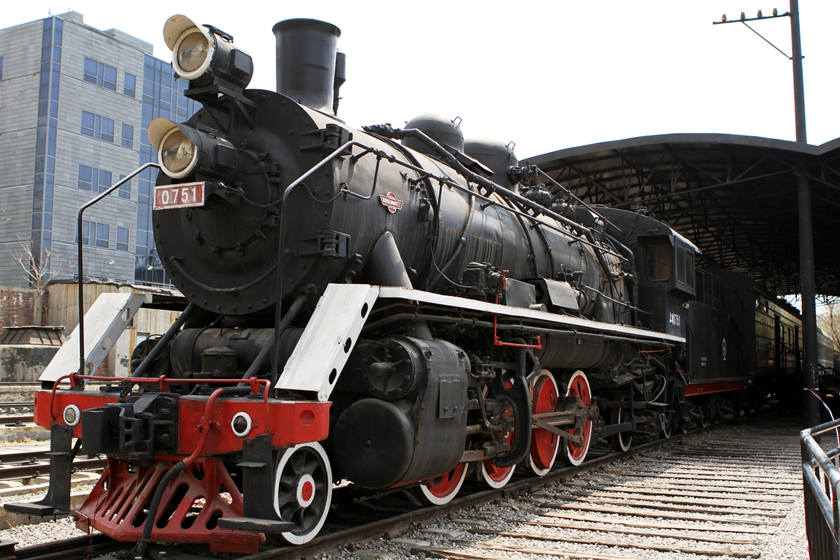Chinese Name: 798 艺术街 Pronunciation: 798 yì shù jiē
English Name: 798 Art District / DAD-Dashanzi Art District / 798 Art Zone
Opening Hours: 10:00-17:00
Building Time: 2002
Best Visiting Time: All year round
Suggested Visiting Hours: 2-3 Hours
Address: No.4 Jiuxianqiao Road, Chaoyang District, Beijing.
Popular Activities: The “798 Art Festival” is held in 798 Art District every year.
Admission Ticket Fare: Free (Note: Few of galleries and exhibition halls may sell admission tickets.)
Building Function: The artists and cultural organizations around the world are gathering here to display the art and variety of culture to visitors.
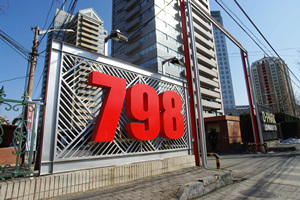
Located in the Chaoyang District of Beijing, 798 Art District is also called DAD-Dashanzi Art District. It is in the northeast of Beijing center that once to be the site of state-owned factories including 798 Factory, which originally manufactured the electronics and later developed into a world-famous art district.
798 Art District covers an area of 600,000 square meters. This zone collects various cultural elements and new style of living and working. It is famous around the world for its contemporary art and 798 lifestyle as a cultural concept and LOFT fashionable way of living and working. Visitors can appreciate the art exhibition, galleries, design studios, fashion shops and artist studios. There are also restaurant, bars, etc.
798 Art District has become the new regional mark of Beijing City. There are many attracted places, such as galleries, studios, exhibitions. Besides these interesting art areas, visitors also can go to the fashionable shops or bars and enjoy the delicious food in restaurants.
In January 2008, there are more than 400 cultural organizations in total. These organizations come from Italy, Britain, France, the Netherlands, Belgium, Germany, Australia, Japan, South Korea, Mainland China, Taiwan, Hong Kong and other countries and regions have settled down in this art district. Visitors can find a lot of interesting things in 798 Art District.
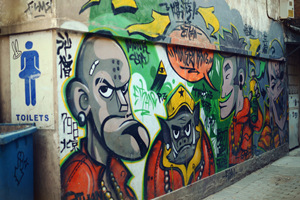
The history of the 798 Art District starts from industrialization of new China. This site was once a project during the first five-year plan of new China. The factory was originally named as “Beijing North China wireless joint equipment factory” in the past, which is 718 Joint Factory in short. The joint factory was approved by Chinese Prime Minister CHOU EN-LAI. It was designed and built by the experts from the former Soviet Union and the former German Democratic Republic.
In 1952, the Joint Factory was firstly built at Jiuxianqiao area, a place without any industrial foundation. In October 1957, the leaders of China announced that the joint equipment factory was put into production. The fast development of this factory is a miracle at early times of the new China establishment. It was the achievement of China’s previous leaders’ hard working. In addition to 798 joint equipment factory, the 774 factory, 738 factory were built and finished at the same time. These factories were not only changed Jiuxianqiao area to a new industrial district but also started China’s first large-scale development in China electronics history.
The 718 joint equipment factory has great contribution to the development of electronics, national defense and communication industry of China.
In April 1964, the organizational system of 718 Joint Factory was dismissed, and 706, 707, 718, 797, 798 and 751 factories were established instead.
In December 2000, the former six factories of 700, 706, 707, 718, 797, and 798 were reorganized and named Beijing Seven Star Science and Technology Co., LTD. This corporation is regarded as one of the first batch of high technology corporations. The Seven Star Group rented out these factories in order to cooperate with the reforming plan of Dashanzi Area.
In 2002, art organizations and artists came here to rent and transformed the factory. New comers gradually developed these plants into several galleries, art centers, artists' studios, design companies, restaurants and bars. The site attracted many artists and organizations. This unique place was named as Beijing 798 Art District.
In 2006, the 798 Art District has become one of the first concentrations of cultural creative industry by the Government of Beijing City and Chaoyang District. It was listed as an art zone of the Cultural Creative Industrial Base of Beijing by government organization. The site was regarded as a creative and cultural place. Many famous artists around the world come to this area, including musicians, sculptors and publishers.
The 798 Art District plans to keep its unique features and to develop tourism in the future.
Beijing 798 Art District can be regarded as a successful case of transforming an old industrial area into a cultural and creative art district. Since its establishment 20 years ago, the 798 Art District has become a cultural totem and a window for Beijing with its distinctive contemporary art characteristics to the world.
There are several reasons why the 798 Art District is so attractive. First, the artistic creation space of the artists in the 798 Art District is personal, cool, and novel, which satisfies some people who want to understand the life and working conditions of the artists. Second, the 798 Art District’s artworks are full of unique and individual real-life ideas, making many people interested in watching, speculating, and purchasing. The third is that the workshop in the 798 Art District is in a Bauhaus building style that East Germany aided in the 1950s. It is tall, thick, well-lit, warm, quaint, and stable. There is a feeling of being suddenly open and comfortable when visitors come to it, coupled with the factory’s original ecological decoration by the artists, making the factory’s architectural features more prominent and more attractive to visitors.
It is precisely for the above three reasons that the 798 Art District has a steady number of visitors, and continues to be popular. The 798 Art District that attracts a large number of visitors is not only a rare and unique cultural and artistic resource of Beijing but also a tourism resource with unique charm of Beijing. We should promote and develop the tourism industry in the 798 Art District on the basis of maintaining a peaceful and excellent ecological environment for artistic creation so that more tourists will be influenced by the art, and art trading will increase tourism consumption. It is necessary to have tourism elements in several key links to achieve the above goals, such as the transportation planning outside the area and the development planning within the site, with the participation of tourism management departments, tourism enterprises, and tourism experts. The advantage of tourism intervention is that the art district will consider visitors' needs, such as where shops, toilets and parking lots should be set up, and how road construction meets the requirements for bus entering and exiting. There will be more careful consideration. The art area should be designed and planned according to high requirements and high standards, for example, following the standards of the A-level scenic spots and tourism demonstration sites.
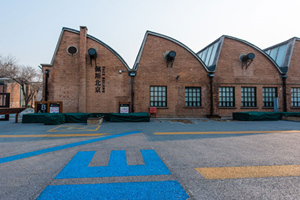
There are many art exhibitions in 798 Art District every year. The contemporary art, cultural and creative industry designs gather in the district to demonstrate the concept of contemporary art or a unique lifestyle. The 798 Art District promoted the development and prosperity of this zone.
The 798 Art Center (706 Hall) is in the well-known Beijing 798 Art District, and its exhibition hall is about 1000 square meters in area and 8.6 meters high. Its north decorated with slantwise louvers with daylight, which is the main feature of the Bauhaus hackle buildings. The giant vermilion slogans on the ceiling, scrap equipment and apparatus were preserved, history and art agglomerate here and bring us tremendous visual impact.
It does not limit itself to organizing exhibitions of contemporary art and designs. The art center also has a service of hosting high-level cultural and commercial activities. People can attend the various fairs, fashion shows, product launches, press conferences, social parties and other corporate services.
It gathers a large number of artistic and cultural celebrities, art organizations and other business activities. There are world-famous brands display the new designs and diversified art exhibitions, such as the well-known international brands, Mercedes-Benz, Dior, Hugo Boss, Nike, Mark Cheung. All of them have held promotional activities in 798 Art Center. It becomes a perfect place for people who advocate fashion and appreciate these unique designs.
The 798 Art Center has functions of the information service center of the zone. Visitors can know not only the latest exhibition information in the 798 Art Center but also the history of 798 art and development.
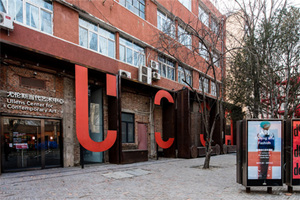
The "798 Art Festival" is held in 798 Art District every year, which celebrated in September and ends in October. It was hosted by Beijing 798 Art District Management Office. Large activities were held here with numerous artists and organizations in this zone. The festival will be held for two weeks including opening ceremony, themed exhibitions, and closing thank party and all exhibitions organized by different agencies in the art zone. It attracted many domestic and foreign tourists to visit 798 Art District.
This festival has an international character. There are contemporary artworks, architectural and cultural works gather in the zone and its urban lifestyle attracted attention from all around. The 798 Art evolved into a cultural concept and influenced our ideas on working and urban living. A lot of famous artists and art organizations from domestic and abroad came to the zone. They brought us a new concept and built 798 Art Zone as the center of the exhibition of culture and art. Their works followed the instruction policy of “protection, exploration, stability, development”.
The Old Factory bar had been reconstructed from a work area of the previous 798 Factory. It originally kept the facilities and machines of the old factory and added the concept of art and culture into it. The Old Factory Bar provides Italian cuisine. There are “798 Space” and “Art Book Shop” for customers. The Old Factory Bar service to both contemporary art exhibitions and commercial activities. It’s a wonderful place where people can have a feel of being in the post-industrial age.
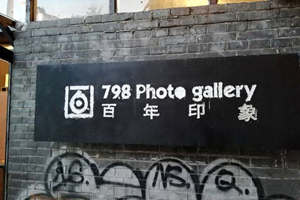
Most of the photos exhibited in the gallery are from Chen Guangjun, and these photos are hard to see at any other place in daily life. For example, there is a personal exhibition named “Hope Project” which is Xie Hailong’s original artworks.
It mostly provides venues renting service for press conferences, fashion shows and other activities. One thing that can not be missed here is that since the buildings of 798 Space follow the Bauhaus style, the roofs of the buildings are curved serrated, which is even rare to find in Germany, even if it was designed by experts from former G.D.R 50years ago.
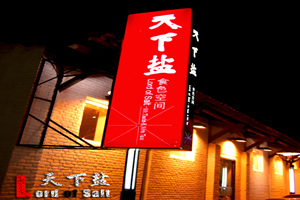
Lord of Salt is a restaurant in side 798 Art District. It is known for its authentic Sichuan dishes. The chef comes from a small city in Sichuan Province, and his cuisine has the authentic Sichuan flavor. Most people will try the spicy chicken which will be a wonderful experience for those who taste it the first time. Chinese people like Sichuan cuisine very much in their daily life. It is one of the most delicious foods in China.
This coffee shop is famous. Italian coffee is good at this café. The owner Huang Rui believes that his coffee is much better than others. Pizza and sandwiches are also good options. Its architecture is inherited from the original 798 factory.
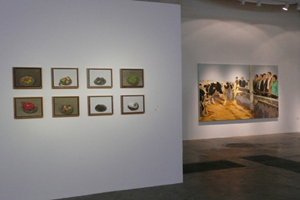
This is the largest area which as a professional gallery in 798 Art District. People can see the opened dormer roof for the birds in the gallery. The latest European art films will be shown here sometimes that people can hardly see at any other place in Beijing.
The famous contemporary artist Lu Jie is the owner of Long March Cultural Communication Center. In this center, you can see the record of one of his early events, in which he was the artist group leader, following the Long March route and communicating with the local artists. They experienced almost the whole Long March route. Folk art exhibitions here, for example, the Shanxi paper cuts from Gao Fenglian, will arouse a visitor’s keen interest in Chinese art and culture.
VINCENT CAFÉ is the best little family-style restaurant in the 798 Art District. The French owner Vincent, who started to learn cooking and management at the age of fifteen in Paris, used to be the chief manager of a famous French restaurant in Beijing. The sweet and savory pancakes from him are very delicious. Meat and vegetable filling or ice cream and fruit filling are must-tries for visitors. There is a wonderful drink called SHOOTER, which is made of three different alcoholic drinks and mixed in a small cup. The owner Vincent is an interesting person, he always said to the visitors who come to the VINCENT CAFÉ that we have only one chance to spend our life, so we shall try to spend it with pleasure every day.
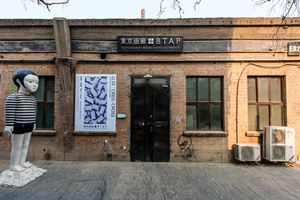
Beijing Tokyo Art Project is the first gallery in the art district and known for its contemporary art. In 2002, after years of planning and working, Tabata Yukihito established Beijing Tokyo Art Projects. It can be seen as an experimental project of the Tokyo Gallery, which is established in1950s.
798 Art District is a large zone, and its width and length are both about 1 mile. Various galleries, exhibitions and art centers are gathered here. The layout of these units is all in the renovated 798 factory buildings. Walking along the main road, you can take your time to visit them one by one.
Take bus 401, 405, 445, 973, 988, 991 and get off at Wangyefen Station(王爷坟) or Dashanzi Lukou Nan Station (大山子路口南).
Take bus 403, 593, 851 or 854 and get off at Dashanzi Lukou Dong Station(大山子路口东).
By Subway
Take Subway Line 14 to Wangjing Nan Station (望京南) and get out from Exit B1, and then walk east 20 minutes or take bus 403 at Xibajianfang Station and get off at Taixilukou East Station.
